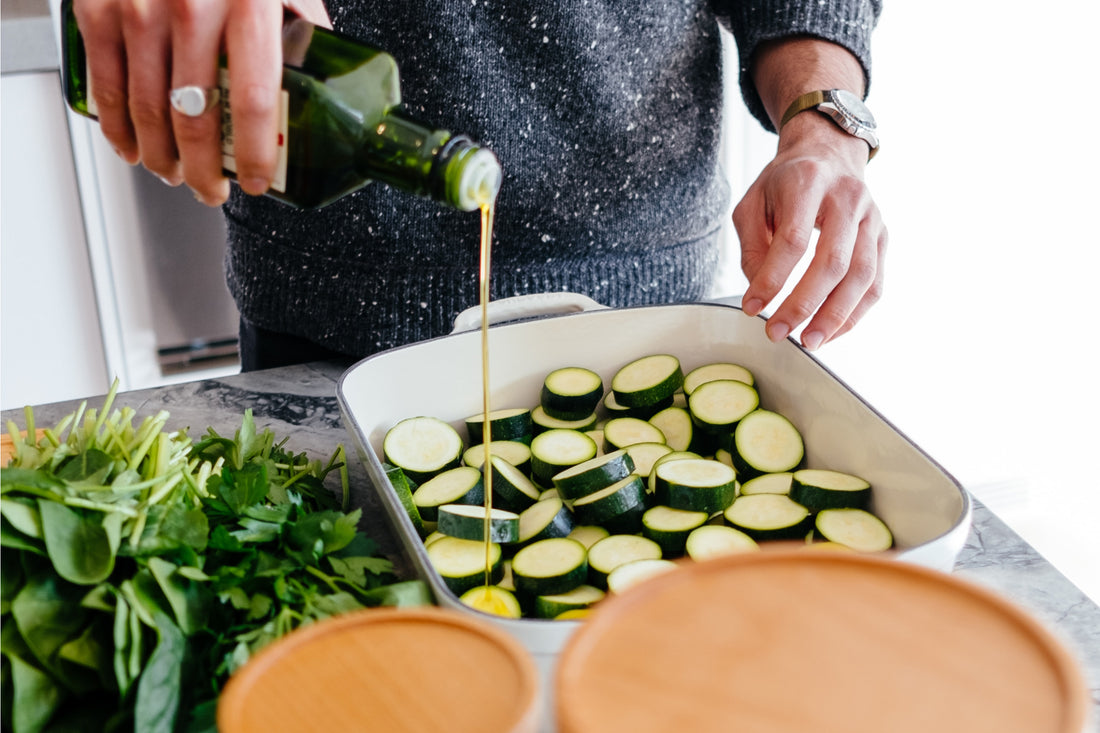Los propósitos de Año Nuevo de muchas personas giran en torno a comer alimentos más sanos, hacer más ejercicio y reducir los vicios nocivos como el alcohol y el tabaco. Pero, ¿ha oído hablar de alguien que se haya propuesto cuidar mejor sus dientes? El oil pulling, una práctica medicinal tradicional india, puede ser el complemento perfecto para sus esfuerzos por desintoxicarse, ponerse en forma y estar más sano. Después de todo, una boca sana y feliz es un fuerte indicador de un cuerpo sano y feliz. Así que, pensemos un poco en nuestros fieles dientes perlados en 2016.
Puede que aún no hayas oído hablar de esta nueva tendencia emergente en materia de higiene dental, pero, de hecho, existe desde hace miles de años y está viviendo una especie de renacimiento en Estados Unidos. Se trata de una práctica natural, en pocas palabras, que consiste en enjuagar suavemente la boca con una cucharada de un aceite, como el de coco o el de sésamo, durante veinte minutos cada mañana antes de cepillarse los dientes o beber algo. Quienes han adoptado este hábito informan de resultados sorprendentes, como un aliento más fresco, una menor sensibilidad dental e incluso unos dientes más blancos y brillantes.

Un diente en el tiempo
Antes de que en el siglo XX se inventaran los cepillos de dientes, las pastas dentales químicas y el hilo dental, nuestros antepasados encontraron formas ingeniosas de proteger sus dientes y tratar diversas enfermedades crónicas e infecciosas. De hecho, los estudios de dientes antiguos de esqueletos humanos prehistóricos muestran que nuestros antepasados cazadores-recolectores tenían dientes mucho más sanos que los del hombre actual.
El perfil de los dientes de los estadounidenses modernos no es muy agradable. Debido a nuestra ingesta elevada y tóxica de azúcar y a nuestra actitud desganada ante los cuidados dentales, que suelen ser costosos, alrededor del 95 por ciento de los estadounidenses padecen algún tipo de caries y una cuarta parte tiene caries sin tratar.
Las caries dentales, las enfermedades de las encías y la placa dental son causadas por bacterias que reaccionan con el azúcar en la boca. Estas bacterias crean una capa que se adhiere a la superficie de los dientes y produce un ácido que extrae los minerales de los dientes y debilita su estructura. La mala noticia es que una vez que los dientes se han cariado, desaparecen.
El oil pulling tiene sus raíces en la medicina ayurvédica , un sistema medicinal holístico tradicional del norte de la India con más de 5000 años de historia. En la tradición ayurvédica, se creía que el aceite “extraía” las toxinas de la boca, prevenía la sequedad y reducía la inflamación.
Según la medicina ayurvédica, se cree que partes de la lengua se conectan a diferentes órganos del cuerpo, como los riñones, el hígado, el corazón, los pulmones y el estómago. Se cree que el oil pulling puede ayudar a desintoxicar todo el cuerpo y ayudar a curar enfermedades crónicas, así como a prevenirlas.
Si bien esto puede parecer descabellado para quienes son más cínicos con respecto a las prácticas de curación holística o la medicina alternativa, tenga en cuenta que los científicos han encontrado evidencia convincente de que las cargas bacterianas no saludables en la boca pueden provocar todo tipo de resultados no deseados , como obesidad, enfermedades cardíacas, diabetes y cáncer. La inflamación crónica que se produce cuando la boca lucha contra las bacterias no deseadas puede tener consecuencias terribles que se extienden mucho más allá de las encías.
¿Cómo funciona el Oil Pulling?
El oil pulling tiene varios efectos potentes que ayudan a eliminar todas las toxinas de la boca. Cuando se mezcla con la saliva, las partículas de aceite se adhieren a las bacterias de la boca y se adhieren a los dientes. Esto ayuda a reducir la carga bacteriana en la boca y, por lo tanto, ayuda a reducir la acumulación de placa en los dientes, fortalecer las encías y refrescar el aliento.
Muchos defensores del oil pulling afirman que ayuda a blanquear y fortalecer los dientes, dejándolos más brillantes y suaves, y descubren que la extraña acumulación de pelusa tarda más en formarse en los dientes durante el día. También reduce la sensibilidad y elimina los signos de la gingivitis, como las manchas de sangre al escupir la pasta de dientes.
Además, al reducir las bacterias en la boca, el oil pulling puede ayudar a prevenir infecciones de los senos nasales y del oído, y a solucionar problemas de la piel como el acné y el eczema. Puede ayudar a la digestión al promover una flora bacteriana más saludable en el intestino, acelerar el metabolismo y promover la pérdida de peso. Algunos incluso afirman que puede ayudar con los problemas de sueño y las migrañas.
¿Por qué elegir el aceite de coco?

El aceite de coco tiene propiedades antibacterianas, antimicrobianas y antifúngicas potentes, debido a las altas concentraciones de ácido láurico. Esto significa que el aceite de coco es el aceite perfecto para matar las bacterias no deseadas en la boca, eliminar el mal aliento y prevenir el desarrollo de placa, caries y deterioro dental. Además, una vez que te hayas acostumbrado a la sensación ligeramente extraña de un bocado de aceite arremolinándose en tu boca, el aceite de coco tiene el beneficio adicional de su suave fragancia y delicioso sabor.
Sin embargo, si el aceite de coco no es de tu agrado o si presentas una reacción adversa a él, también puedes probar con aceite de sésamo, aceite de girasol o aceite de orégano. La ventaja de usar aceite en lugar de un enjuague bucal estándar es la ausencia de químicos y la mayor viscosidad del líquido, lo que ayuda a penetrar en todos los rincones y grietas de los dientes.
Algunos consejos para empezar a hacer oil pulling
Toma una cucharada de aceite en tu boca. Es posible que tengas que ablandar suavemente el aceite de coco colocando el frasco de vidrio en agua tibia durante diez minutos. Haz esto a primera hora de la mañana antes de comer o beber algo. Ten en cuenta que la primera vez que lo pruebes, es posible que la textura y las sensaciones te resulten un poco desagradables, pero deberías acostumbrarte rápidamente.
Haz buches con el aceite durante veinte minutos. Si te duelen los músculos y la mandíbula, hazlo con más calma, no hace falta forzarlo. Si veinte minutos te parecen demasiado, prueba sesiones más cortas de cinco a diez minutos para empezar y ve aumentando gradualmente a medida que te sientas más cómodo con la rutina.
No tragues el líquido cuando hayas terminado y no te alarmes si sientes que la cantidad aumenta de tamaño en tu boca: es tu saliva natural mezclándose con el aceite, lo cual es perfectamente normal. Además, no te desanimes si el aceite adquiere un color lechoso después de beberlo. Esto es una señal de que el aceite ha recogido muchas bacterias de tu boca y ha hecho su trabajo. Es mejor escupir en la papelera, ya que el aceite podría obstruir las tuberías del baño.
Cuando haya terminado, enjuáguese bien la boca con agua varias veces para eliminar los últimos restos de aceite y luego continúe con su régimen diario de cuidado dental de manera normal: use hilo dental y cepíllese.
Ten en cuenta que las técnicas como el oil pulling son paliativas y preventivas, y no pueden restaurar tus dientes si ya están dañados. El oil pulling no debería sustituir al cepillado y al uso del hilo dental, ni ser una excusa para posponer las visitas bianuales al dentista. Sin embargo, este remedio natural es tan sencillo y eficaz que no hay nada de malo en probarlo durante dos semanas y ver si te gustan los resultados. Podría ser el mejor hábito que adquieras en 2016.






